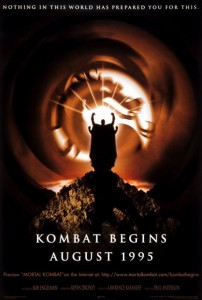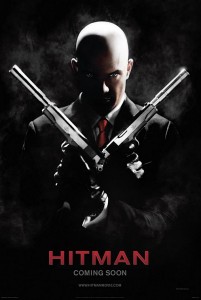As games become more mainstream and various media audiences intertwine it comes as no surprise that both the game and movie industries are trying to cash in on the other. Since the early days games have drawn on other pop cultural licenses to bolster sales, but only in the last ten years has the technology existed to make these titles able to expand a franchise beyond the ubiquitous side scrolling action games of old. Now a video game can be used to make stories that tie into the movie’s own mythos, either as a compliment or even as a true sequel. With increasing regularity though it seems the flow of titles is going the other way as more and more movies try and make use of gaming licenses.

The initial batch of these game movie adaptations made it painfully apparent that for the most part (at the time at least) game stories were not ideal for the medium of cinema. To accommodate this shortcoming, the original plots were butchered beyond recognition in adapting them for the silver screen. During the early 90s this produced examples such as the Super Mario Bros. and Street Fighter movies. They took games that centered on play mechanics and tried to shoehorn in ridiculous stories in a shameless attempt to attract young gamers to theaters. Perhaps the highlight of this initial batch of game movies was Mortal Kombat. The game was about a martial arts tournament with the fate of the world at stake and the film delivered just that: a tournament. Transcending the need for any further explanation the movie consisted of a string of fantastically choreographed fights. Thus MK retained the feel of the game and created a movie that was entertaining in its own right.
While MK was shallow the fan service it paid was at least faithful to the source material. But why for so many movies does this seem such a difficult goal to achieve? The last ten years have seen a glut of movies being produced with their origins in gaming. As games have become more rounded in their storytelling it seems like the move to film should have become less perilous. Entire plots need only be lifted and fleshed out. Unfortunately the process of fleshing out the idea into a full screenplay is where the troubles in adaptation arise. The main problem is that games usually focus on a single protagonist against unimaginable odds. This is a dynamic seen in numerous action movies over the years, but movies also place some focus on the antagonists. Look at Die Hard, a movie that focused on the relationship between the hero and villain with equal time spent exploring both. Games, though, spend the majority of their time with the hero/player character. Thus the writers adapting the game to the screen are left with the difficulty of having to try to keep the feel of a license that is unsuited to the medium of film.

The writer’s dilemma is exacerbated by the fact that the anticipated audience is a fan of the game, and thus the most critical of anything that soils their beloved franchises memory. It is a lose-lose situation with the original plot being unsuited to the medium and any liberties being taken resulting in fan uproar. I am just as guilty of such an outcry. The treatment of the Resident Evil series on its trip to celluloid infuriated me. The writers shunned the original game plot in favor of a story based in the same fiction. In retrospect the original was a reasonable zombie action movie. It made use of a few monsters and locations from the game that enabled it to exist along side the original fiction as a side story. But RE had one of the more fleshed out fictions of mainstream games at that time, indeed the plot its self was drawn from and American horror movie template. It begged the question why bother with the license when all it does is restrict you creatively and attract people predisposed to be critical. Perversely the proceeding RE movies took a different approach. In the same way a monkey with oven gloves may try to tread a needle, the second movie tried to pull the plot back into that of the games. Liberties with character and plot alienated fans, but more importantly the poor acting and story failed to make it stand up even in isolation, unlike the original.
No, I won’t talk about the third RE movie, or my opinions on the planned new trilogy.
Recently I had my first experience with a game movie license where I had little knowledge of the source material. Hitman was a game I played for a few months at university on my PC before abandoning the series and never returning. I kept up on the games to a point, the concept and style of the games appealing greatly to me but never enough to tempt me back in. Thus when the movie was announced I was indifferent about it as a product, but its existence peaked my interest. Hitman was a popular game but in no way reached the popularity of the other games that received a movie crossover (forgetting Postal and Blood Rayne which I think we all should) so it being chosen as a movie crossover was unexpected.

Sometime after the movies release I saw it at my local rental store and picked it up. For me with my limited knowledge of the games I found it relatively faithful (excluding a ludicrous knife fight). I had some idea of the character and style, but little else beyond that. Hence I was able to allow for some poor characterization, filling in the gaps with my limited knowledge but had few other preconceptions. The mission based structure of the titles lent flexibility to the plot around the protagonist, and the situation the movie placed him in seemed at least plausible. More surprising to me was the fact I enjoyed it. It wasn’t amazing, but the performances and plot were solid enough to forgive the ill judged twists.
Online reviews of Hitman tend to be less than favorable which leads me to wander if there is an optimal amount of knowledge to be able to enjoy a film like this? Perhaps having just enough understanding of the character and concepts, but without the hypercritical fanaticism? Or maybe my expectations were just lowered by conversation around the movie and years of game movie disappointment.
Good or bad Hitman is one of a new breed of game movies. With producers seemingly starting to look more to what the game license offers in terms of setting and plot rather than just the fan base attached to it. A refreshing shift in some respects if producers are going to continue to insist on mining the world of gaming for inspiration, but one that seems unnecessary. After all there seem to be few unique elements to any game that are protected to the point that a movie would really require the license to create its own similar fiction. The dream would be that these crossovers only occur when the creators of a property see some true value in it. Unfortunately we know that they happen for more cynical reasons, exploiting fans of the source material, but its good to want something more for the franchises we love.